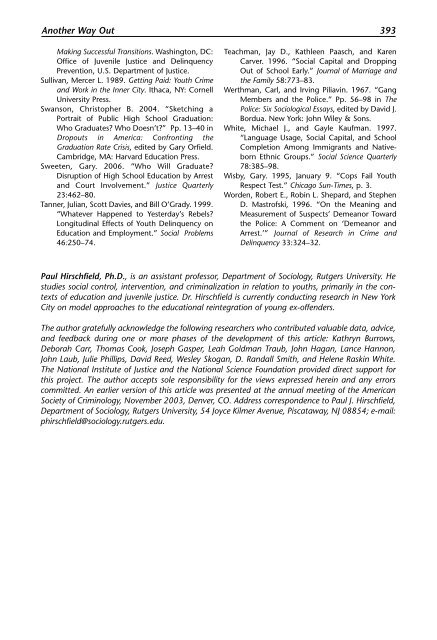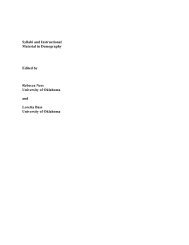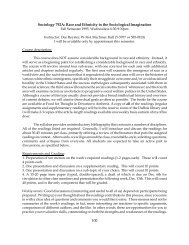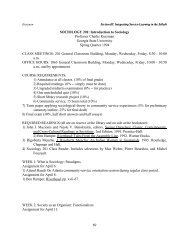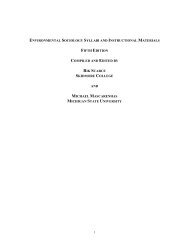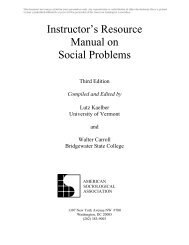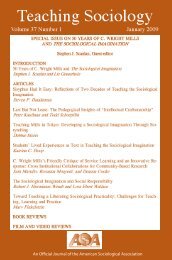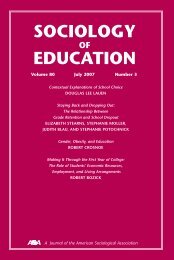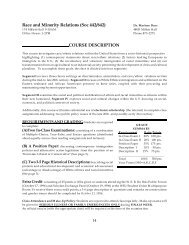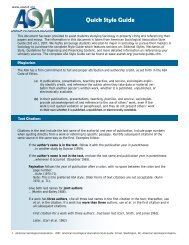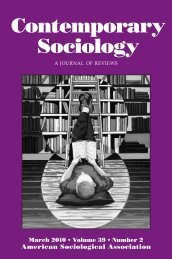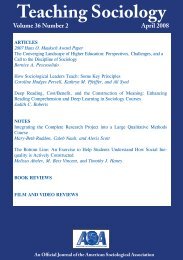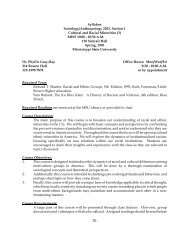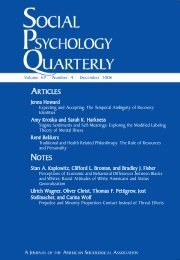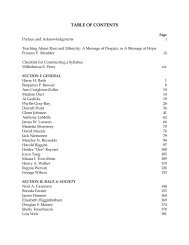SOCIOLOGY EDUCATION - American Sociological Association
SOCIOLOGY EDUCATION - American Sociological Association
SOCIOLOGY EDUCATION - American Sociological Association
You also want an ePaper? Increase the reach of your titles
YUMPU automatically turns print PDFs into web optimized ePapers that Google loves.
Another Way Out 393<br />
Making Successful Transitions. Washington, DC:<br />
Office of Juvenile Justice and Delinquency<br />
Prevention, U.S. Department of Justice.<br />
Sullivan, Mercer L. 1989. Getting Paid: Youth Crime<br />
and Work in the Inner City. Ithaca, NY: Cornell<br />
University Press.<br />
Swanson, Christopher B. 2004. “Sketching a<br />
Portrait of Public High School Graduation:<br />
Who Graduates? Who Doesn’t?” Pp. 13–40 in<br />
Dropouts in America: Confronting the<br />
Graduation Rate Crisis, edited by Gary Orfield.<br />
Cambridge, MA: Harvard Education Press.<br />
Sweeten, Gary. 2006. “Who Will Graduate?<br />
Disruption of High School Education by Arrest<br />
and Court Involvement.” Justice Quarterly<br />
23:462–80.<br />
Tanner, Julian, Scott Davies, and Bill O’Grady. 1999.<br />
“Whatever Happened to Yesterday’s Rebels?<br />
Longitudinal Effects of Youth Delinquency on<br />
Education and Employment.” Social Problems<br />
46:250–74.<br />
Teachman, Jay D., Kathleen Paasch, and Karen<br />
Carver. 1996. “Social Capital and Dropping<br />
Out of School Early.” Journal of Marriage and<br />
the Family 58:773–83.<br />
Werthman, Carl, and Irving Piliavin. 1967. “Gang<br />
Members and the Police.” Pp. 56–98 in The<br />
Police: Six <strong>Sociological</strong> Essays, edited by David J.<br />
Bordua. New York: John Wiley & Sons.<br />
White, Michael J., and Gayle Kaufman. 1997.<br />
“Language Usage, Social Capital, and School<br />
Completion Among Immigrants and Nativeborn<br />
Ethnic Groups.” Social Science Quarterly<br />
78:385–98.<br />
Wisby, Gary. 1995, January 9. “Cops Fail Youth<br />
Respect Test.” Chicago Sun-Times, p. 3.<br />
Worden, Robert E., Robin L. Shepard, and Stephen<br />
D. Mastrofski, 1996. “On the Meaning and<br />
Measurement of Suspects’ Demeanor Toward<br />
the Police: A Comment on ‘Demeanor and<br />
Arrest.’” Journal of Research in Crime and<br />
Delinquency 33:324–32.<br />
Paul Hirschfield, Ph.D., is an assistant professor, Department of Sociology, Rutgers University. He<br />
studies social control, intervention, and criminalization in relation to youths, primarily in the contexts<br />
of education and juvenile justice. Dr. Hirschfield is currently conducting research in New York<br />
City on model approaches to the educational reintegration of young ex-offenders.<br />
The author gratefully acknowledge the following researchers who contributed valuable data, advice,<br />
and feedback during one or more phases of the development of this article: Kathryn Burrows,<br />
Deborah Carr, Thomas Cook, Joseph Gasper, Leah Goldman Traub, John Hagan, Lance Hannon,<br />
John Laub, Julie Phillips, David Reed, Wesley Skogan, D. Randall Smith, and Helene Raskin White.<br />
The National Institute of Justice and the National Science Foundation provided direct support for<br />
this project. The author accepts sole responsibility for the views expressed herein and any errors<br />
committed. An earlier version of this article was presented at the annual meeting of the <strong>American</strong><br />
Society of Criminology, November 2003, Denver, CO. Address correspondence to Paul J. Hirschfield,<br />
Department of Sociology, Rutgers University, 54 Joyce Kilmer Avenue, Piscataway, NJ 08854; e-mail:<br />
phirschfield@sociology.rutgers.edu.


